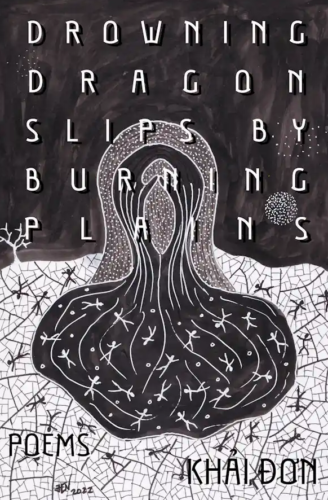A rice plant feeds me younggrains. My feet takeroot on the barren dirt. Crackedheel. Bleed. Seedlings suckmy liquid — but a waterbuffalo strikes. The fieldfalls by its hooves. The Earth opensits chest. My half bodysinks. The buffalo whistles a song — Pullme — Her song molds my parentsin silt and straw. Parents soakme in the flood. I squeezethe buffalo’s horn. She goresparents. They disperse intoherons. Orphan. I snuginto the buffalo’s arms. Enwind.My palms hold her hooves. The sky turnsriver. Earth vomits. Heronsare drowned. My cracked heelsdevour silt. The sun tips the riverover. If I sink into the buffalo’s belly,I grab her umbilicalcord. If I drink her milk, earthcannot swallow me. I breakthe cycle. Dry feet. Dead rice.
Arid Delta
Khải Đơn
Feature Date
- July 9, 2024
Series
Selected By
Share This Poem
Print This Poem
“Arid Delta” from DROWNING DRAGON SLIPS BY BURNING PLAINS: by Khải Đơn.
Published by Texas Tech University Press in October 2023.
Copyright © 2023 by Khải Đơn.
All rights reserved.
Reproduced by Poetry Daily with permission.

Khải Đơn is a journalist turned poet. Her creative sphere is centered on the Mekong Delta, the land of sinking devastation into the rising sea. Her works question how women and daughters would imagine a liveable space after the catastrophe. Her poetry was exhibited along with the exhibition Shifting Sand in Barbican, and Gropius Bau. Her writings have appeared in The Orion Magazine, The POETRY Magazine, diaCRITICS, Cha Asian Literary Magazine, and sin cesar. Her debut poetry collection was published by The Diasporic Vietnamese Artists Network (DVAN) and Texas Tech University Press in 2023.
Drowning Dragon Slips by Burning Plains counters the narrative held in the West about women and the land of the quaintly "lush" and "charming" Mekong Delta. A rice field in the middle of the communist and American-backed government, the delta was an essential resource that fed both sides of the war in Vietnam. The Mekong Delta went through countless massacres on an immense scale. Yet, history wiped the injuries away as if the river forgot. In her debut collection, Khải Đơn explores the meaning of being a woman in a land robbed of its innocence. Through a collage-like approach of personal history and fables, Khải Đơn's poems present an insidious flow of recollections that young people do not want to remember and that old people avoid discussing.
In poems that lament and wonder, Khải Đơn reclaims the narrative for her people by unexpected material yielded from social research, CIA documents, and American military evaluations to erode the dominant narrative about the Delta in and after the war. Her poems tell tales of the old bombs turning into mangoes, rice germinating out of bullet holes, and every woman losing her way home.
Poetry Daily Depends on You
With your support, we make reading the best contemporary poetry a treasured daily experience. Consider a contribution today.




